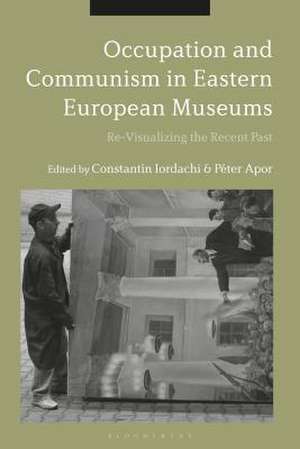Occupation and Communism in Eastern European Museums: Re-Visualizing the Recent Past
Editat de Dr Constantin Iordachi, Dr Péter Aporen Limba Engleză Hardback – 25 aug 2021
| Toate formatele și edițiile | Preț | Express |
|---|---|---|
| Paperback (1) | 193.07 lei 6-8 săpt. | |
| Bloomsbury Publishing – 22 feb 2023 | 193.07 lei 6-8 săpt. | |
| Hardback (1) | 570.68 lei 6-8 săpt. | |
| Bloomsbury Publishing – 25 aug 2021 | 570.68 lei 6-8 săpt. |
Preț: 570.68 lei
Preț vechi: 817.05 lei
-30% Nou
Puncte Express: 856
Preț estimativ în valută:
109.22€ • 113.72$ • 92.30£
109.22€ • 113.72$ • 92.30£
Carte tipărită la comandă
Livrare economică 10-24 martie
Preluare comenzi: 021 569.72.76
Specificații
ISBN-13: 9781350103702
ISBN-10: 1350103705
Pagini: 304
Ilustrații: 11 bw illus
Dimensiuni: 156 x 234 x 25 mm
Greutate: 0.6 kg
Editura: Bloomsbury Publishing
Colecția Bloomsbury Academic
Locul publicării:London, United Kingdom
ISBN-10: 1350103705
Pagini: 304
Ilustrații: 11 bw illus
Dimensiuni: 156 x 234 x 25 mm
Greutate: 0.6 kg
Editura: Bloomsbury Publishing
Colecția Bloomsbury Academic
Locul publicării:London, United Kingdom
Caracteristici
Takes a comparative approach and sheds light on big issues like history, memory and politics
Notă biografică
Constantin Iordachi is Professor in the History Department at Central European University, Hungary. He is the author of Liberalism, Constitutional Nationalism and Minorities: The Making of Romanian Citizenship, c. 1750-1918 (2019) and editor of Comparative Fascist Studies (2009).Péter Apor is Research Fellow at the Institute of History, Hungarian Academy of Sciences, Hungary. He is the author of Fabricating Authenticity in Soviet Hungary: The Afterlife of the First Hungarian Soviet Republic in the Age of State Socialism (2014).
Cuprins
List of ImagesPart 1 - History, Memory, and Politics in Eastern European Museums1. Memorializing Recent 'Pasts' in Eastern Europe, Péter Apor and Constantin Iordachi, (Institute of History, Hungarian Academy of Sciences, Hungary) and (Central European University, Hungary)2. 'Remembering' versus 'Condemning' Communism, Constantin Iordachi, (Central European University, Hungary)3. Institutional Narratives of Communism in Slovakia: Substituting the Non-Existence of the Official Museum of Communism, Martin Kovanic, (Mendel University, Czech Republic)Part 2 - Museums of Occupation4. Tackling the Past in Poland: Museifying World War II, Maud Guichard-Marneur, (University of Gothenburg, Sweden)5. From Museum as Memorial to Memory Museum: On the Transformation of the Estonian Museum of Occupations, Kirsti Jõesalu and Ene Kõresaar, (both University of Tartu, Estonia)6. (Re)constructing the Past: Museums in Post-Communist Croatia, Vjeran Pavlakovic, (University of Rijeka, Croatia)Part 3 - Museums of Communism and the Politics of History 7. Boundary Objects of Communism: Assembling the Soviet Past in Lithuanian Museums and Public Spaces, Egle Rindzeviciute, (Kingston University London, UK)8. The 'Display' of Communism in Germany, Irmgard Zürndorf, (The Centre for Contemporary History, Germany)9. Remembering the GDR, Martin Sabrow, (Humboldt University of Berlin, Germany)10. Discussing the Past, or Airing the Depots: Refashioning Exhibitions of Socialism in Serbia, Olga Manojlovic-Pintar (Institute for Recent History of Serbia, Serbia) and Aleksandar Ignjatovic (University of Belgrade, Serbia) 11. Life and Death of the Communist Object in Post-Communist Romanian Museums, Simina Badica, (National Museum of the Romanian Peasant, Romania)Part 4 - Museums of Communism: Practices of Representation 12. Laboratory: A Proposal for Representing Communism in Romania, Viviana Iacob, (University of Bucharest, Romania)13. Museums of Socialism from Below: Grass-roots Representations of the Socialist Past in Contemporary Bulgaria, Rossitza Guentcheva, (Institute for Advanced Study, Germany)14. Canons of Civilization and Experiments of Spectacle: Exhibiting Contemporary History in Hungary, Péter Apor, (Institute of History, Hungarian Academy of Sciences, Hungary)15. Conclusions, Péter Apor (Institute of History, Hungarian Academy of Sciences, Hungary) and Constantin Iordachi (Institute of History, Hungarian Academy of Sciences, Hungary) Index
Recenzii
This book is an indispensable guide to the complexities of the post-communist efforts to institutionalise, through museums and exhibitions, various memories of the defunct dictatorial regimes.
Occupation and Communism in Eastern European Museums is a wonderful testimony to the power of scholarship to intervene, through sharp analysis, in memory debates and act as a counterforce to those right-wing populist nationalisms that are currently endangering democracies across east-central and eastern Europe - and the wider world.
Eastern Europe is a place where history really matters: it evokes heated passions and conflicts, both within nations and between states, and museums are at the forefront of this battlefield. This book greatly helps understand the complicated and fascinating east European memory landscape and the pivotal role the museums play in it.
Occupation and Communism in Eastern European Museums is a wonderful testimony to the power of scholarship to intervene, through sharp analysis, in memory debates and act as a counterforce to those right-wing populist nationalisms that are currently endangering democracies across east-central and eastern Europe - and the wider world.
Eastern Europe is a place where history really matters: it evokes heated passions and conflicts, both within nations and between states, and museums are at the forefront of this battlefield. This book greatly helps understand the complicated and fascinating east European memory landscape and the pivotal role the museums play in it.
